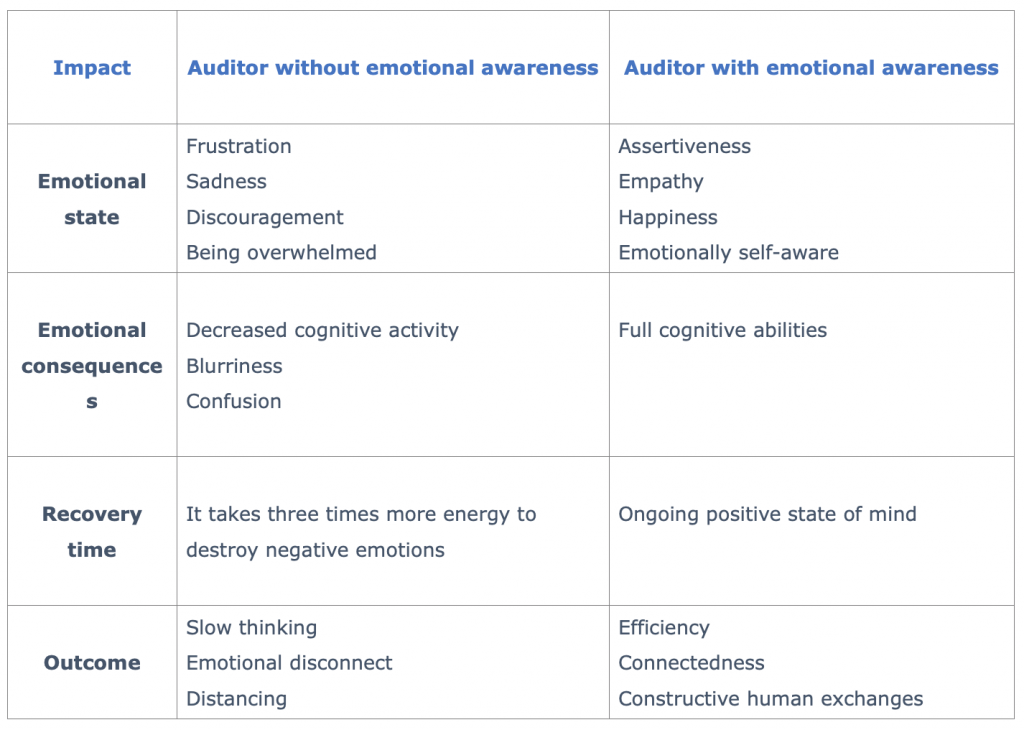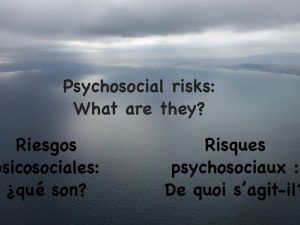- Psychosocial risk factors in the auditing context
- The importance of business ethics in corporate social responsibility auditing

In the business world in general, and the auditing world in particular, emotional intelligence is what allows a person to go through the day smoothly, silently juggling the emotions crossing their mind and their path. The current respect towards emotional intelligence (EI) opens a new door as people are noticed for their individual values beyond their mere professional results 1.

The metaphor used for this article is the photograph above showing a beech tree standing alone in a golf course in Brussels, Belgium. The tree has been there for years, keeping its balance while adjusting to weather afflictions and human transformations. In the business world, those who stand tall are the leaders who grasp the impact of EI, adjusting to change and transformation.
EI has become a recognized asset, especially during the search for high-ranking profiles. However, its benefits receive worldwide recognition at all levels of society and in any context: this photograph was taken during a training program on values I witnessed, in Iquitos in the Amazon region of Peru. Here, a group of teens meets their leader at a community center on the edges of the river, to learn and practice EI techniques 2.
1 https://www.psychologytoday.com/intl/basics/emotional-intelligence
2 Project organized by www.infant.org.pe and funded by UNICEF (2018).
What is emotional intelligence?
The term emotional intelligence was used by two researchers 3 in 1990 and made popular in 1995 by Daniel Goleman’s book Emotional intelligence, where he defines self-awareness as “the first component of emotional intelligence; which makes sense when one considers that the Delphic oracle gave the advice to ‘know thyself’ thousands of years ago”.
In other words, it is the ability to “recognize, understand and manage one’s own emotions as well as the emotions of others”.
Goleman demonstrated in the Harvard Business Review how self-knowledge and competencies forge exceptional managers; however, what makes them successful lays in their leadership values emanating from their emotional intelligence.

3 Salavoy P. and Mayer J., 1990. Emotional Intelligence. Imagination, Cognition, and Personality Journal
4 Goleman Daniel, 1995. Emotional intelligence, p. 95.
Emotions and reason are connected

António Damasio, an expert in emotions, goes further by asserting that emotions and feeling are the center of all human interactions. He suggests that “emotions and reason are one same thing: emotions are at the starting point of a process that progressively evolves to become reason”. And since “emotions are our bodyguard”, we’d better understand them!
Knowledge about one’s emotions and the ability to control their sudden appearance and their flow, is an indicator of personal self-awareness.
The prevalence of self-awareness
When used wisely, self-awareness is an insatiable source of knowledge that eases interactions with others. Fred Kofman states that good business starts with the self-awareness of its leaders: “a leader who learns to decipher intimate emotions, behaviors, expectations, goals, struggles, is able to maintain composure in front of employees, with an open-minded perspective. Self-awareness must be mastered before pretending to understand other people’s emotions” 5.
It comes to the famous saying: judge yourself before judging others!
Our personality is composed of positive and negative traits; the self-awareness meaning comes with the acknowledgment of personal strengths and weaknesses. It includes the knowledge of one’s limits and the threshold beyond which a situation becomes hard to handle. A self-aware leader is objective and acknowledges good or wrong-doing, identifying errors and finding solutions.
5 Kofman, Robert. 2006. Conscious Business, p.3 & 5.
Emotional intelligence practice
To get back to Dr. Damasio’s theory, emotional intelligence requires awareness and training because our brain remembers positive and negative experiences that he calls “somatic markers” and stores them. Learning to choose the right marker at the right time is a skill requiring practice.
Somatic markers stamp our memory since childhood with positive and negative markers. They form our basic emotional realm and it is up to us to keep markers engaged and updated.
EI brings awareness to analyze situations, adjust to the needs by building a strategy to move forward.

The impact of emotional intelligence in the business world

The Consortium for research on EI provides ample examples regarding the field of EI. One of the examples puts a dollar value on the benefits of EI, and I mention it because it shows the power of this often neglected knowledge. Members of a consulting firm were assessed on their EI competencies and results showed that “partners who scored above the median on 9 or more of the 20 competencies delivered $1.2 million more profit from their accounts than did other partners; a 139 percent incremental gain” 6.
6 Boyatzis, R. et al., 1999. Clustering competence in emotional intelligence.
Emotional intelligence during a compliance audit
This chart compares positive and negative attitudes during a compliance audit, leading to drastically different outcomes. A self-aware auditor shows the will and the ability to adjust to a situation and encourages constructive exchanges to comply with certification requirements: this is EI applied to the benefit of all. The auditor without emotional engagement has a hard time staying focused and the behavior affects the audit outcome.

The auditor’s EI is a determinant factor in the outcome of an audit. This simplified example underlines how an emotionally engaged auditor is equipped to face uncertainties. The unprepared auditor is hesitant, overwhelmed and frustrated, causing frustration to the auditees and slowing the audit process.
Emotional intelligence testing
EI is a skill and therefore can be learned and measured.
Tests are now available to measure a person’s self-knowledge and problem-solving abilities as a marker of one’s emotional quotient or EQ.
Kofman states that people with high EQs tend to be better coworkers or leaders because they are tuned to other people’s experiences.

Tests were set in place to evaluate the emotional intelligence of employees and a famous one was created by the MSCEIT team: it states that “emotional intelligence is one of hundreds of parts of our personality. Is it the most important predictor of success in life or work? It probably is part of “success” but it is not the sole ingredient, nor is it the most important one”.
Emotional intelligence learning options
Whether you or your employees are ready to discover the world of emotional intelligence, several options are available depending on the needs:
1. At the university level, EI classes are now offered to students as part of their leadership curriculum, and include practice through assessment tools and experiential exercises.
2. In the corporate world, communication companies provide training programs in EI for employees, activated by practice and exercises. The workforce progressively develops abilities to face unusual situations without feeling fear nor anger. HR managers are aware of EI tests available to evaluate potential candidates for high-ranking positions.
One particular test was created by MSCEIT team, who states that “emotional intelligence is one of hundreds of parts of our personality. Is it the most important predictor of success in life or work? It probably is part of “success” but it is not the sole ingredient, nor is it the most important one”.
3. IMAGO.AUDITING provides guidance and support to organizations looking at expanding their EQ.

A lesson learned from this article is the relevance of EI in the auditing profession, or any profession for that matter. Corporate senior management should consider offering emotional intelligence training to their workforce because
Emotional intelligence is becoming an indispensable asset.
Every individual who receives EI training sees changes at the personal and professional levels. EI plays a crucial role in self-confidence acquisition. Practice allows difficult conversations to take place with less harmful effects: EI offers negotiation tools to lead a pleasant personal and professional life.
Thank you!
Check IMAGO.AUDITING and its new website www.imago-int.eu. Stay connected and receive upcoming newsletters with updates on articles, the blog and webinars. Subscribe at info@imago-int.eu.
About Oliver
Related Articles
3 Comments
Pingbacks
[…] The value of emotional intelligence in compliance audits […]
[…] my article about emotional intelligence, I suggest that the control of emotional risks within the auditing context starts with […]
[…] my article about emotional intelligence, I suggest that the control of emotional risks within the auditing context starts with […]
Leave a reply Click here to cancel the reply
You must be logged in to post a comment.





